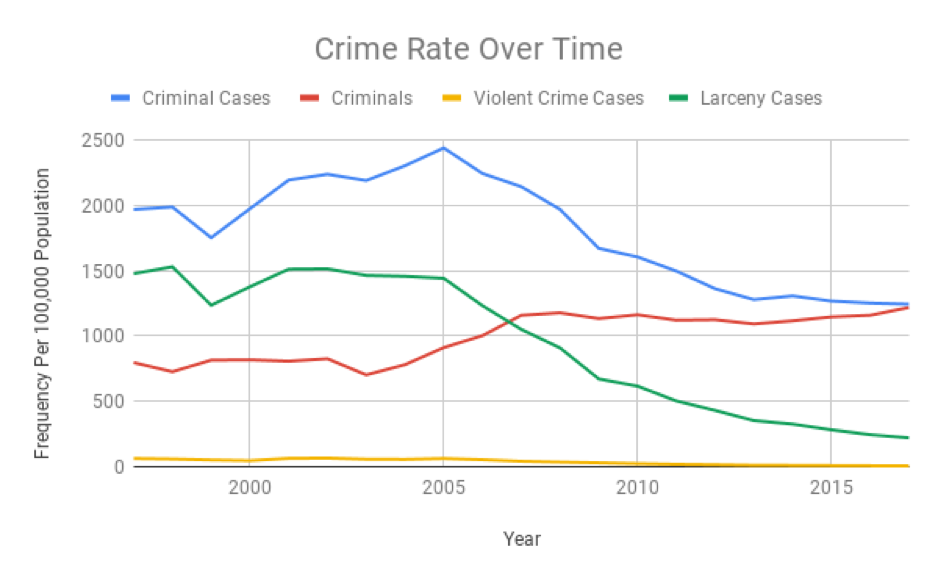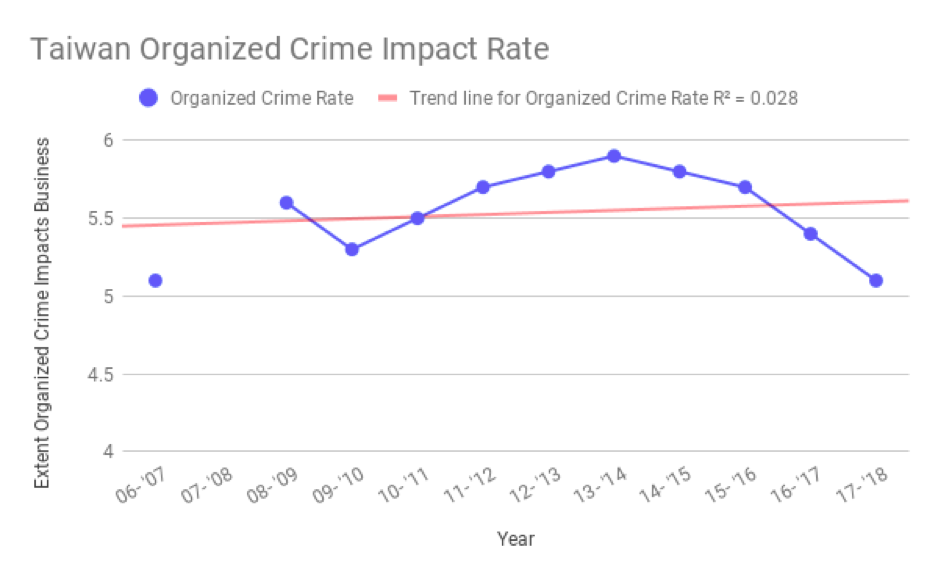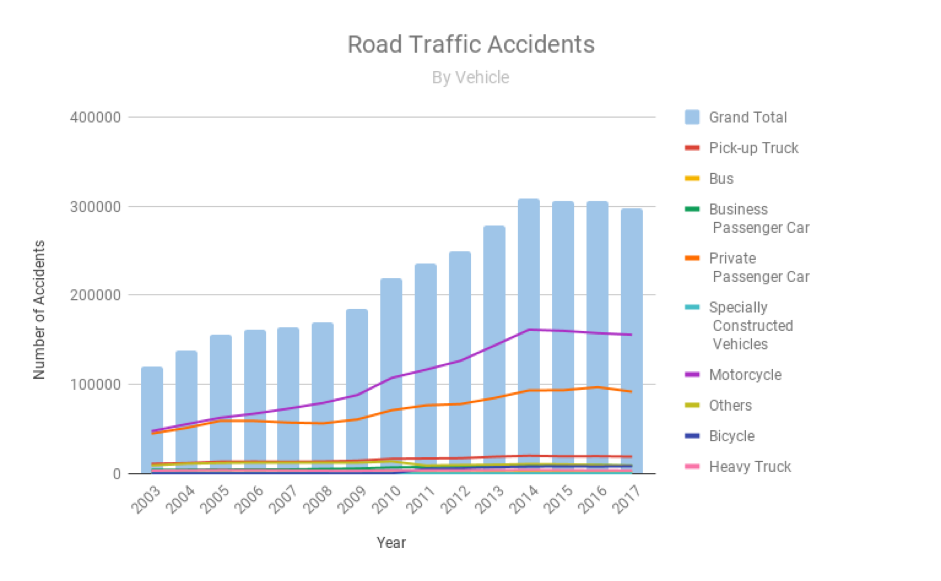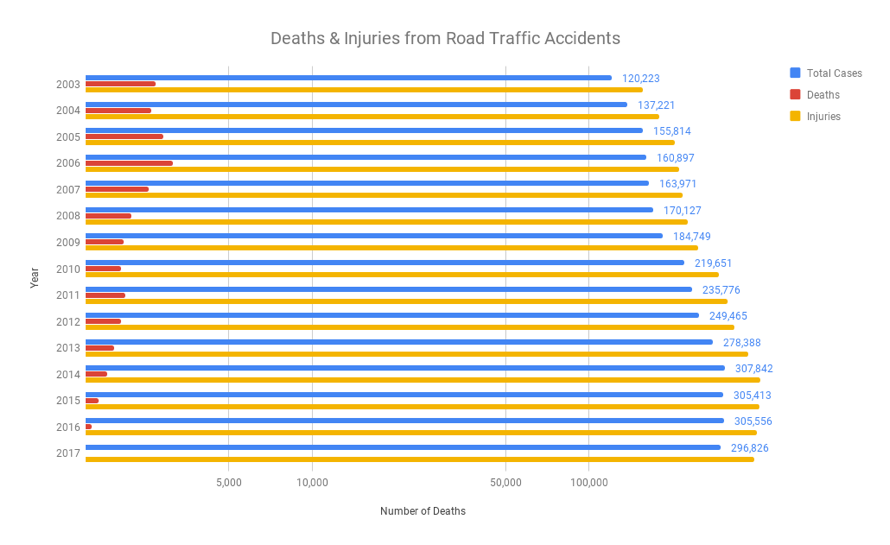Guest-Writer's Submission
How Safe is Taiwan Really?

Source:Shutterstock
From road safety to crime rate, a quick dip into some statistics to take an unflinching look at where Taiwan stands where safety is concerned.
Views
How Safe is Taiwan Really?
By James Grantweb only
I’ve got a new job that requires daily travel between what I may be the two most geographically diverse points on Taipei Public Transport. It’s a home-work dash that requires either taking a solid hour resentfully clutching on to those awful head-height hanging handles on the MRT, or a tetchy hour and a half jostling for one of the route’s coveted seated bus places.
This is the situation whether getting to work at rush hour or in the mid-afternoon lull, which thankfully gives me time to plan articles to complain about public transport in, but unfortunately looks set to eat two hours out of every workday for the rest of my career here.
Alternatively, a brisk twenty-minute scooter ride can whisk me from my apartment to my employer’s front door via a generous network of inner-city bypass roads.
What’s strange is that whenever I suggest using these roads to regularly scooter my commute, people shake their heads and shudder their shoulders, saying how dangerous Taiwan’s roads are.
I’ve never lived somewhere outright dangerous, but I have never lived anywhere that feels safer than Taiwan. I’ve been quietly dreaming of joining the scooter commuter crowds since I arrived, but have always struggled to reconcile people’s warnings about the danger on Taiwan’s roads with the country’s kind, considerate populace and relaxed atmosphere. Maybe I’m oblivious, but in the few bits of Taiwanese TV and film I’ve managed to watch, I’ve also seen repeated reference to the country’s road deaths gang culture and street violence, which I’ve never come across in person.
A quick dip into some numbers would seem to support doubts. Numbeo estimates that all of the top 5 most law-abiding countries in the world are in Asia, with Taiwan ranked as the 4th most law abiding, outdone only by Qatar, Japan and the UAE. Numbeo also has Taipei down as one of the world’s safest cities, behind only Abu Dhabi, Doha, Osaka and with some surprise, Quebec City. Numbeo may not carry the cache of some more heavyweight number-crunching sources, but seems fairly widely referenced, so I’ll believe it’s facts aren’t all fabricated.
I’ll highlight here that Numbeo’s methodology does rely on people self-reporting perceived vulnerability to crime, rather than directly comparing national crime rate statistics. There are advantages to this methodology, but one vulnerability of the data is that in the unlikely event that you had a markedly thin-skinned population that were abnormally prone to worry about crime, that city would place poorly on the crime list regardless of actual crime rate.
A 2015 study by the World Health Organisation provides insight into a different kind of safety, specifically road danger. When Taiwan is ranked for road safety, it tumbles down the list to 35th out of 189, below countries including Monaco, on 0, the Federated States of Micronesia on 1.9 and the UK on 1.9. Taiwan registers 6.8 road deaths per year for every 100,000 inhabitants, comfortably below the International Average of 17.4. So although it could be safer, it seems a stretch to call it a specifically "dangerous" country when the nation’s stats sit so handsomely high on the list.
If we accept that Taiwan’s roads may not be dangerous in global terms, we can look into where road danger exists within the country. The excellent National Police agency database has detailed which are unfortunately only available about as far back as 2003. They do show us that since 2003, motorcycle accidents have jumped up to become by far the most common cause of road traffic accident, which goes some way in explaining my colleague’s fear of bikes.
A hugely useful bit of research from Healthdata.org shows us that over the last ten years, road death has become a substantially less significant cause of death in Taiwan, falling by 25% between 2007 and 2017, and from the second to the 8th most common cause of premature death between 1990 and 2010. From this we could draw the conclusion that people have long memories, and when they warn me off my bike, it is because the total number of incidents have remained fairly high, with motorcycle injuries specifically making up a very large percentage, as overall road deaths decrease.
In short, Taiwan’s roads are getting far better, but the risk of sustaining an injury on a motorbike remains high.
If we turn our attention to crime rate over time, we can see that Taiwan’s recent history is slightly mixed, with a reduction in criminal cases and larceny, or theft, per 100,000 head of population over the last 15 years. What surprises me is that during this time, Taiwan has been recovering from a glut of criminal cases in 2005, and that since then, criminal rates have been slowly rising. Larceny and violent crime rates are predictably low, but this would seem to raise a surprising suggestion that Taiwan’s history of crime is more lively than imagined.

Turning our attention to organised crime, The World Economic Forum has a useful subset within its Global Competitiveness Index, in which the extent to which Organized Crime imposes on business is estimated. Finland, Norway and Oman sit pretty a the top of the list, with a impact score of 6.8, 6.6 and 6.6 (the perfect score of 7 representing ‘no impact to business at all). El Salvador comes in at 137 on the list, with a score of 1.5 just off the most impactful score of 1.
Taiwan comes in at 49 on the list, with a respectable impact score of 5.1 behind France and Mongolia, but just ahead of Algeria and Israel.
Though this is a decent score, it could be that a perception of danger and lawlessness is informed by the situation is surrounding and similar countries, with Japan the 35th best with a 5.4 score, Korea at 66th with a score of 5.0, Singapore in 5th with 6.4 and China down in 79th with a score of 4.6.
Have you read?
♦ Eight Questions about Travel Safety in Taiwan
♦ Opinion: Taiwanese Drivers Turn Streets into Warzone
♦ Security Cameras Everywhere: The Price of Convenience?
When you adjust the data to compare organised crime rates for high-income countries, Taiwan ranks at 36 out of 52, with Italy coming in at the bottom, and amongst East Asia & Pacific Nations, Taiwan comes in at 8th out of 17. It would seem then that though Taiwan isn’t riddled with organized crime, it is prevalent in the country to an extent that strays from my own squeaky clean image of the country. This excellent article over on TOPICS outlines historical links or organized crime present since Chiang Kai-shek’s flight from the mainland, and may account both for local belief in the strength of Taiwan’s gangs, and for Taiwan’s middling ranking for organized crime now.
Ideally I’d be in a position display a decent account of Taiwan’s historical organized crime rate here, but traipsing back through World Economic Forum site for that date becomes impossible before 2006, and nobody seems willing to provide any data for the range 2007- 2008 (whether that year’s report was a particular vintage edition or uniquely awful has to remain purely a matter of speculation.
Traipsing back through historical account of Taiwan’s Organized Crime rate to 2006 (as far back as the data is readily available), as outlined in the table below, would seem to bare this out. If you’ll excuse the absence of data from 2007- 2008 (nobody seemed willing to provide me with a free copy of the report for this year, either I imagine because it was a particular vintage edition or exactly the opposite), we can see that the impact on Taiwan’s organized crime on business has shown a slight overall reduction over time (with insufficient data available to describe this as significant) and a slight expansion since the years 2013-2014.

This section then has left us with a slightly muddled view of the role of organized crime in Taiwan. It has a slightly higher presence in the country than I might have expected, but a fairly modest role by many international standards.
All-in-all, we’ve covered a fairly large amount of ground. I’ve shown that Taiwan’s roads are increasingly safe, but that risk of motorcycle injury remains stubbornly high. I’ve shown that Taiwan’s crime rate is generally quite good, but in the process of recovering from a strangely lawless phase in 2005. I’ve also shown that Taiwan’s relationship with organised crime is improving, but marginally more active than you’d expect for a country as law-abiding as Taiwan. In sum, I’ve managed to confirm most of the assumptions I’d set out to challenge.
Edited by Sharon Tseng
About the Author
James Grant is a contributing writer at Commonwealth Magazine. He writes mainly on topics of politics, economics and Universal Basic Income.
(This article presents the opinion or perspective of the original author / organization, which does not represent the standpoint of CommonWealth Magazine.)









